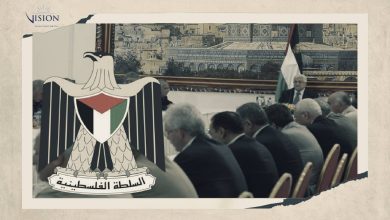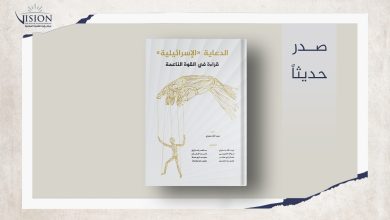Vision Center issues the Book: “Benjamin Netanyahu: Reproducing the Zionist Project within Civilizations Clash System”

Benjamin Netanyahu represents a unique case in “Israel’s political experience. Since its establishment in 1948, no Israeli leader, including some of the founders, military generals, and key figures who played big influencing roles, has managed to remain in power for such a long term as Netanyahu has done. Moreover, Netanyahu has been running Prime Minister since 1996 for four terms; the first was between 1996 and 1999 and the rest followed successively since 2009, which approaches 14 years now.
However, while the position of prime minister in “Israel” enjoys wide powers, the head of state is an honorary position with very limited powers. This calls for the need to study the case of Netanyahu, especially as an extreme right-wing political figure who has got many convictions and ideas that pose a threat to the region and its stability.
Despite the many claims and theorizations that the Israeli entity represents the only democratic state in the region, for adopting modern and democratic methods in its political institutional management, and despite being a secular, capitalist entity, its leaders have never escaped the influence of religious and ideological narratives, and have never stopped exploiting religion and ideology in its internal and external rhetoric. However, what distinguishes Benjamin Netanyahu from his predecessors is the fact that he surpassed them in extremism based on religion and historical and civilizational pretensions.
The book addresses Netanyahu’s attempt to position himself and his government in the context of the supposed civilizational conflict between Western civilization and Islamic civilization, considering the Zionist project as part of a larger civilizational conflict between the West and the Islamic civilization, and that it constitutes the first line of defense for Western civilization, as being civil, modern and human, in the face of the Islamic world, that it is labeled with extremism, backwardness and aggressiveness.
By this narrative, Netanyahu claims that he and his government are part of the conflict between “the good and the evil” and between the civilized world and the underdeveloped world, demanding the West to provide him with all forms of support necessary to enable “Israel” to carry out its “sacred duty” in confronting the Arab and Islamic world. To that end, he did not spare any possible tools to convince the West of this vision and to change the image of the Israeli entity from a brutal occupation force that practices all kinds of oppression and terror against a defenseless people fighting for their freedom and dignity to a state that contributes to protecting the West from an “imagined” danger coming from the East.
The book presents an analysis of Netanyahu’s religious, ideological, political and even social backgrounds, and the extent of their impact on his extremist positions towards Muslims and Arabs in general and towards the Palestinians in particular. It also constitutes a qualitative addition to the Arab library, and a serious contribution to the world of political and intellectual knowledge.
In addition, the book provides readers with an introduction to Netanyahu’s political vision towards the Palestinian cause and regional issues, which was the main objective that prompted the Vision Center for Political Development to conduct a scientific academic study, the first of its kind in Arabic, that offers Arab and Palestinian politicians, academics and intellectuals an academic epistemological material that helps them approach the truth regarding Netanyahu’s character and positions and its intellectual backgrounds, especially in light of a stage witnessing political developments and events that created a complex political scene in which priorities have changed and the compass of many powers and states in the region has shifted; the scene has become blurry and confused to the extent that some states have started to see the occupying entity of “Israel” as a friend that they could cooperate with, while and the voice of normalizers and theorists of normalization with the Israeli entity has been raised.
Netanyahu was successful in taking advantage of that difficult historical moment to present himself as a friend of the Arabs and a new prophet for the Jews, leading them towards security and stability and standing with them on the threshold of a stage in which “Israel” will be a natural part of the region.
The author
Muhannad Mustafa: He holds a PhD from the School of Political Science at the University of Haifa in 2012. He was a visiting researcher at the Center for Islamic Studies at the University of Cambridge, and at the Arab Center for Research and Policy Studies in Doha. He is currently the Director General of Mada Al-Carmel: The Arab Center for Applied Social Studies in Haifa, and a Lecturer in the MA Program in Israeli Studies at Birzeit University.
Dr. Muhannad has published dozens of books and scientific articles in Arabic, English and Hebrew, including the book (The Israeli Academic Institution: Politics, Knowledge and Economics 2014). And the book (Palestinians in Israel: Indigenous Minority Politics in the Ethnic State 2009), and the book (The Palestinians in Israel: The Politics of Faith after Oslo 2017) which is published by Cambridge University Press.





